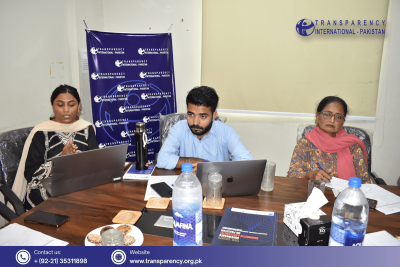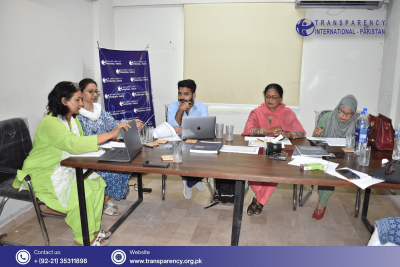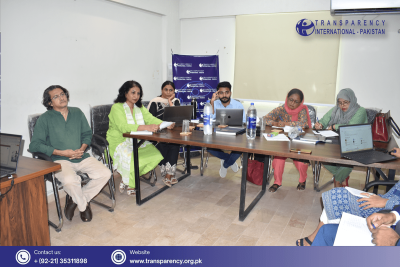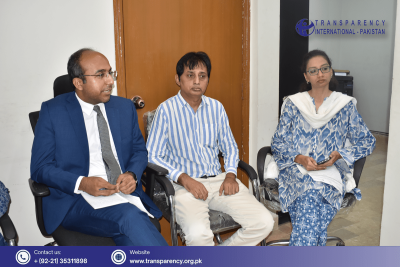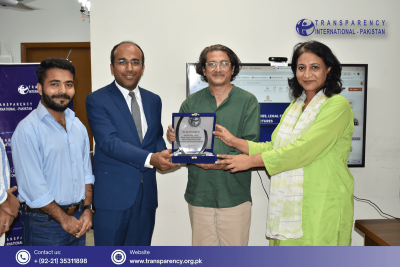Journalist Fellowship on Climate Finance and TransparencyModule 03: National Climate Policies, Legal Frameworks and Governance Structures
Journalist Fellowship on Climate Finance and Transparency
Module 03: National Climate Policies, Legal Frameworks and Governance Structures
Venue: TI Pakistan Office, Karachi / Online
Date: Thursday, September 18, 2025
Transparency International Pakistan organized the third module of its Journalist Fellowship on Climate Finance and Transparency on September 18, 2025, at its Karachi office in a hybrid format. The workshop focused on strengthening journalists’ understanding of climate policies, legal frameworks, and governance structures at both global and national levels. It also served as capacity building to prepare fellows for COP30, highlighting how journalists can play a meaningful role in shaping climate discourse and reporting.
The workshop began with opening remarks from Mr. Kashif Ali, Executive Director, TI Pakistan. He emphasized the importance of equipping journalists with knowledge to critically engage with climate governance. He stressed that journalists by understanding policies, governance mechanisms, and finance flows, can play a pivotal role in ensuring transparency, and bridging the gap between policy commitments and real impacts on communities.
Ms. Nasreen Memon, Project Coordinator, TI Pakistan, provided a recap of the fellowship’s earlier modules, underlining the skills and tools introduced to participants so far. She noted that the program will conclude with a celebration of achievements for the three best journalistic pieces in December 2025.
The first session “Understanding Global Climate Governance: Frameworks and Institutions” was conducted by Ms. Raima Mehmood, Policy and Research Coordinator, TI Pakistan. She explained that global climate governance is built on rules, institutions, and processes that allow countries to cooperate on climate change. She highlighted the UNFCCC as the parent treaty, along with Paris Agreement’s universal NDC-based system and their role in shaping decisions. She also noted Pakistan’s active role in international forums such as G77 + China and the Climate Vulnerable Forum, emphasizing country’s updated NDC targets of reducing emissions by 50% by 2030, conditional on international support.
Moving forward, an in-depth presentation on “Pakistan’s National Climate Policies and Implementation Frameworks: Where are we on NDCs?” was delivered by Mr. Yasir Husain, Founder of Climate Action Centre and Darya Lab. He explained that while Pakistan’s NDCs under the Paris Agreement set out emission reduction and resilience goals, gaps remain in implementation. He highlighted major frameworks such as the National Climate Change Policy 2021, the Climate Change Act 2017, and the National Adaptation Plan 2023–2030. Mr. Husain also discussed the importance of climate finance mechanisms like the GCF, GEF, and Adaptation Fund. He emphasized Pakistan’s untapped potential in carbon markets, particularly through mangroves, renewable energy, and climate-smart agriculture.
He outlined low-carbon pathways for cities, including digital data infrastructure, waste and water management, stronger laws and governance, biodiversity for resilience, and clean energy transitions.
Next, Ms. Fariha Fatima, Programme Associate, TI Pakistan, engaged fellows in a discussion on the role of journalists in shaping narratives ahead of COP30. In her presentation “COP30 & Journalists: Shaping Climate Discourse for Action”, she stressed the vital role of journalists in linking global climate negotiations with Pakistan’s realities ahead of COP30 in Brazil. She urged fellows to act as informers, watchdogs, and bridges. She emphasized that journalists must go beyond reporting events by simplifying complex policies, tracking finance pledges, and amplifying the voices of vulnerable groups. Highlighting Pakistan’s acute climate vulnerability, she encouraged fellows to prepare their coverage early, craft accessible narratives, and ensure that global commitments at COP30 translate into tangible benefits for local communities.
Towards the end, story pitches developed by fellows were presented. The pitches reflected the wide range of climate challenges facing Pakistan and included stories on the lack of green spaces in Karachi as a driver of urban flooding, the impact of climate change on date palm cultivation, and the fragile ecosystem of the Indus Delta. Others focused on community resilience and empowerment, such as the Solar Sisters of Thatta bringing light to villages and the struggles of women from marginalized groups in Sanghar facing the decline of cotton cultivation. Energy and governance also emerged as strong themes, with pitches examining the hidden costs of hydropower projects, the Thar’s coal development, and the risks of greenwashing in carbon markets. TI Pakistan team provided constructive feedback, helping participants refine their ideas and climate reporting. This interactive exchange not only improved the quality of pitches but also encouraged fellows to think more critically about narrative framing, evidence use, and audience engagement.
The session ended with a certificate distribution ceremony and networking lunch, marking another milestone in the fellowship’s journey to strengthen data-driven, solutions-oriented climate reporting in Pakistan.

